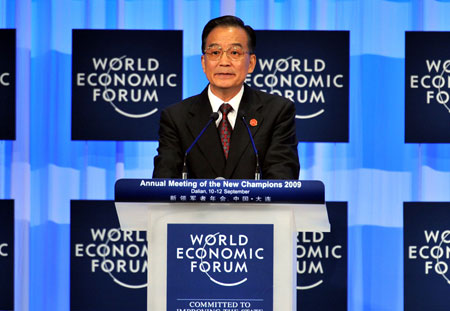|

|
|
Chinese Premier Wen Jiabao addresses the opening plenary of the Annual Meeting of the New Champions 2009, or the Summer Davos, in Dalian, northeast China's Liaoning Province, Sept. 10, 2009. [Xinhua]

|
DALIAN: Following is the translated version of the full text of Chinese Premier Wen Jiabao's speech delivered here on Thursday at the opening ceremony of the Annual Meeting of the New Champions 2009, or Summer Davos:
Build up in an All-round Way the Internal Dynamism of China's Economic Development
Speech by H.E. Wen Jiabao
Premier of the State Council of the People's Republic of China
At the World Economic Forum Annual Meeting of New Champions 2009
Dalian, 10 September, 2009
Professor Klaus Schwab, Executive Chairman of the World Economic Forum,
Distinguished Guests,
Ladies and Gentlemen,
Let me begin by extending warm congratulations on the opening of the third Annual Meeting of the New Champions, or the Summer Davos, and a sincere welcome to you all.
Over the past year, the world economy has experienced the most severe challenge since the Great Depression. We may recall the worries voiced by many people early this year when we gathered in Davos for the World Economic Forum annual meeting. Since then, thanks to the concerted efforts and active measures of the entire international community, some positive changes have taken place. The world economy is beginning to recover, although the process is slow and tortuous. We can now see the light of dawn on the horizon.This is a critical juncture and it is highly significant for political leaders, entrepreneurs, experts and scholars of various countries to gather together here and discuss how to "Relaunch Growth" of the world economy. I sincerely wish this meeting a great success!
This unprecedented global financial crisis has taken a heavy toll on the Chinese economy. Yet, we have risen up to challenges and dealt with the difficulties with full confidence. And we have achieved initial results in our endeavor.
We have arrested the downturn in economic growth. In the first half of this year, China's GDP grew by 7.1 percent, investment expanded at a faster pace, and consumption maintained fast and steady growth. Domestic demand played a stronger role in driving the economy forward. From January to July, 6.66 million new urban jobs were created, income of urban and rural residents increased, and overall social stability was maintained. We effectively managed fiscal and financial risks and kept budget deficit and government debt at around 3 percent and 20 percent of the GDP respectively. Banks' asset quality and ability to fend off risks were improved. At the end of June, the NPL ratio of commercial banks was 1.8 percent, down by 0.64 percentage point from the beginning of the year, and capital adequacy ratio stood at 11.1 percent.
With the world economy still mired in recession, it is by no means easy for us to have come this far. The achievements we have made are not something that dropped into our lap. Rather, they are the results of the proactive fiscal policy and moderately easy monetary policy and the stimulus package that the Chinese government and people have pursued in line with the national conditions. Some people take a simplistic view and believe that China's stimulus package means only the four trillion RMB yuan investment. This is a total misunderstanding.
China's stimulus package focuses on expanding domestic demand and is aimed at driving economic growth through both consumption and investment. Of the total four trillion yuan in the two-year investment program, 1.18 trillion yuan will come from the central government, and it will mainly be used to generate greater investment by local governments and the non-public sector. We have made vigorous efforts to stimulate consumption and make domestic demand, particularly consumer spending the primary driver of economic growth. We have increased subsidies for farmers, raised the minimum purchasing price of grains, introduced performance-based salaries for primary and middle school teachers, and increased the basic cost of living allowances for urban and rural residents so that the people will be able to spend more. In order to boost consumption, we have offered subsidies for the program of bringing home appliances, agricultural machinery, automobiles and motorcycles to the countryside and the program of exchanging used automobiles and home appliances for new ones. Purchase taxes on small-engine and energy conserving and environment friendly cars have been cut by half. In the first seven months, a total of 7.31 million cars were sold and total retail sales of consumer goods rose by 15 percent.

